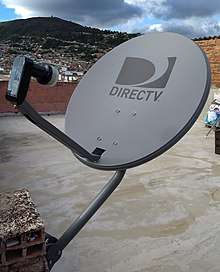Vrio Corp.
Vrio Corp. (formerly DirecTV Latin America LLC; stylized as Vгio) is an American company that manages the commercial operations of the Latin American branch of DirecTV (mostly known as DirecTV Latin America). It is owned by AT&T Latin America. It produces TV content, and owns several TV channels.[3]
 | |
Formerly | Galaxy Latin America Investments, LLC (1994-2000)[1] DirecTV Latin America, LLC (2000-2018) |
|---|---|
| Industry | Telecommunication |
| Founded | 1994 |
| Headquarters | , United States[2] |
| Products | Satellite television |
| Parent | AT&T Latin America |
| Subsidiaries | DirecTV Argentina DirecTV Caribbean DirecTV Chile DirecTV Colombia DirecTV Ecuador DirecTV Perú DirecTV Uruguay DirecTV Venezuela (until 2020) Sky Brasil (93%) Sky México (41.3%) |
| Website | vriocorp |
As of 2018, DirecTV Latin America's legal name was changed to Vrio Corp.[4]
History

In 1994, Hughes Electronics Corporation and Venezuelan media company Grupo Cisneros create a joint venture named Galaxy Latin America, a company intended to distribute DirecTV services in 27 Latin American countries, initially with an offer of 144 channels. In that same year, it enters the Chilean market and then it was launched in Mexico.
In 2000, Galaxy Latin America LLC was renamed as DirecTV Latin America LLC.
In 2005, Grupo Cisneros sold its 14% stake on DirecTV Latin America to The DirecTV Group Inc.[5] While in Mexico and Brazil it merged with rival Sky and disappeared, in South America it absorbed Sky as the latter struggled in the market.
On 19 January 2016, the Secretary of Environment of Bogotá, sanctioned DirecTV's Colombian subsidiary, Directv Colombia Ltda., with a sum of $118 million for placing advertisement without the proper permission from the city.[6] The company violated Decree 959, published in 2000, that regulates where companies can place public publicity.
On 15 September 2017, Reuters reported that AT&T, the owner of DirecTV's U.S. and Latin American divisions, had hired an advisor to consider offering DirecTV Latin America on the public stock market. The principal motive was cited as the need to reduce the debt load AT&T would assume if it took over Time Warner as planned. Since that date, the U.S. Dept. of Justice filed suit to block that acquisition on antitrust grounds, a trial is scheduled to start on 19 March 2018 before Judge Leon of the U.S. District Court for the District of Columbia, and a decision is not expected before June–July. However, even if the deal is blocked, AT&T might dispose of the division as not core to its business.[7] On 19 April 2018, the IPO was cancelled.
On 19 May 2020, the company ceased operations in Venezuela, due to US sanctions against pro-Maduro TV channels Globovisión and PDVSA TV in 2019. These channels require mandatory transmission imposed by the telecommunications commission of Venezuela, CONATEL, while the US sanctions simultaneously block the transmission of these channels.[8]
Subsidiaries
Chile
The Chilean subsidiary of DirecTV has operated in the country since 1994. It bought Sky Chile and absorbed it into its operations. It signed an agreement with GTD Manquehue to offer full telephone, television, and internet services throughout the country.
- During the second quarter of 2011, the company was positioned as the second fastest growing pay TV company in Chile, registering 23.8% of the total market.
- In 2012, the company led the pay TV market with an 18.7% market share.
- Between 2012 and 2015, DirecTV Chile received the "Consumer Loyalty" award NPS.
- Between December 2012 and March 2013, the company was consolidated as the first paid television company that has grown the most in the country.
- Between 2011 and 2016, DirecTV Chile received the National Customer Satisfaction Award ProCalidad as the best pay TV service.
In 2012, it made an agreement with Club Deportivo Universidad Católica to carry the brand name DirecTV on their jerseys. In 2015, it made an agreement with Colo-Colo to also carry the DirecTV logo.
- 2012 -

- 2014 -

- 2015 -

References
- https://www.bnamericas.com/en/news/Galaxy_Latin_America_Changes_Names_to_DirectTV_LA
- Bloomberg. "DIRECTV Latin America LLC". Retrieved 13 May 2018.
- "DirecTV's Latin America Pay-TV Is Booming". Forbes. Retrieved December 15, 2016.
- https://about.att.com/pages/company_profile_latin_america
- https://www.portafolio.co/economia/finanzas/grupo-cisneros-vende-parte-directv-latina-173300
- http://www.eltiempo.com/bogota/sancion-a-directv-por-publicidad-exterior-ilegal/16485402?ts=42 (Spanish)
- https://www.reuters.com/article/us-at-t-m-a-latamdivestiture-exclusive/exclusive-att-weighs-divestiture-of-latin-american-tv-assets-sources-idUSKCN1BR008
- https://about.att.com/story/2020/directv_latin_america_venezuela.html